See our fun live video coverage, which may include your favorite company, here.
From source to table to trash, elephant journal looks for integrity—it’s part of our mission.
This past weekend we were dedicated to hand selecting the companies who were doing it right, acting as true stewards of the earth and as members of our global community.
Expo West has an opportunity to be on the vanguard of innovative, healthy and truly eco products, but as it stands there are mountains of waste produced due to plastic use and packaging. The fundamental issue that drives this is that companies can’t make a profit off of plain apples or oranges, things need to be changed, packaged and marketed as “new!”
Hopefully this list can help everyone become a more mindful and conscious consumer. Congrats to all the winners!
Best of Show > Vegan:
Rawfoodz: These salad dressings and spreads were raw, vegan (nut-free, gluten free, and soy free—made with hemp and coconut oil) and certified Organic—plus packaged in glass. I couldn’t get enough of their Zen Budda (“a budda like no udda”) Garlic Buttery Style Spread—yum. They use chia seeds instead of egg in their caesar dressing.
Raw Balls: Raw, vegan, soy free and gluten free—these balls have got it all. I was happy to see that they differentiate between being GMO-free and Organic, explaining explicitly that the two certifications are no where near being the same. Plus, the packaging is 100 percent compostable (even the plastic-y wrapper! Though it’s in question whether or not it’s home compostable or compostable in industrial composting facilities.) which gives them a spot on the Best Eco-Packaging list. Way to go!
Bhakti Chai: “Fresh, fiery and Fair Trade” Boulder-based Bhakti Chai is so good (and packaged in glass!). The word Bhakti means “devotion through social action” and it’s clear that they are committed to fulfilling that promise. They donate a portion of their annual earnings to support women and girls through a handful of groups. Fun fact: Bhakti microbrews their batches of chai using 4k pounds of organic ginger each week. They’re B-Corp and Fair Trade certified as well as Non-GMO Project verified. My favorite way to drink Bhakti is by mixing half of the Original Blend with half of the less-sweet Toasted Almond Coconut Blend, because the sugar content in the Original is far too sweet for me. I’d like to see Organic certification in the future.
Honorable Mentions: (these products are packaged in plastic, so we can’t ethically give them Best of Show awards. Hoping to see some changes in the future!)
Made in Nature: This was one of the few booths promoting actual food rather than processed junk. I loved their delicious dried fruit and coconut chips. All of their products promise no sugar added, no sulfur-dioxide, no artificial colors or flavorings, no artificial pesticides or fertilizers. Everything is certified Organic and sustainably sourced. More please! All that said, I would like to see them shift to compostable/more recyclable packaging.
Boulder Organic!: The Red Lentil Dahl soup was dahl-icious. I couldn’t believe this certified Organic soup was vegan! Plus they’re doing good in the world—2% of their soup goes to non-profits and a local food share in the Boulder/Denver area, plus they compost all of their kitchen scraps that accumulate when they make their small batches. I’d like to see
Wholesome Chow: First of all, when I came over to their booth the owner was serenading his co-workers with guitar and song (I’m pretty sure he was playing Jefferson Airplane, though I could have been wrong…) Immediately I was excited to learn more about the Organic (USDA and California), Vegan Verified, Gluten Free, and Non-GMO Project Verified baked goods. The brownies were unbeatable!
Temple Turmeric: I’ve already written about how I feel about this company, here. They’ve got a 100 percent transparency and traceability promise where consumers can follow their product all the way back to the soil that it was grown on—pretty cool. Plus they partner with the 10-acre turmeric farm in Hawaii that the founder was staying at when he first fell in love with turmeric. All of their ingredients are Organic, though you can’t give raw honey an Organic certification, so because they include that in some of their blends, they aren’t eligible for USDA Organic certification. It’s an open question whether or not the honey is heated.
Kutoa: These bars are seriously awesome. Similar to the TOMS model, for every bar purchased a child in need (either domestically or globally) gets fed. Makes sense, the name Kutoa is Wwahili for the verb “to give.” They’re Non-GMO Project Verified with a handful of organic ingredients. I would push them to become certified Organic.
Earth Balance: Palm oil is a controversial topic—it’s been associated with rainforest deforestation and with the endangerment and deaths of hundreds of different species. Earth Balance believes that palm oil can be sustainably harvested and to underline this, they are committed to sourcing 100 percent of their palm oil from farmers who meet the requirements of the Palm Oil Innovation Group (POIG). But they’re not just committed to being sustainable with regards to their palm oil sourcing, they’re committed across the board. Here’s a link to read up on all of their eco-awesomeness. Be sure to enjoy this vegan, buttery goodness with a clear conscience (err, well, except for the plastic).
Best of Show > Eco Packaging
Lunchskins by 3greenmoms: I’ve already talked about lunchskins here. They are a dishwasher-safe sandwich/snack bag. They project that one lunch skin to replace 500+ plastic bags (and overall they have saved more than 900 million plastic bags from landfills—woah, baby!) They’re BPA-free (though that might not mean too terribly much) and 10 percent of their proceeds from their Sea Bird Bag support the 5 Gyres Institute, a group committed to reducing plastic in the world. My one critique is the fact that they’re lined with plastic—why not take the eco-packaging one step further and go plastic-free? Seems contradictory.
Nutiva: Since 1999 Nutiva has donated over $2 million to programs that support the advancement of healthy communities and ecologically sustainable agriculture—a number that comes from annual donations of one percent of Nutiva’s annual income. They source 100 percent Organic and Fair Trade products, and their butters and oils all come in glass. Nice! Nutiva is a member of OSC2 a coalition committed to creating fully sustainable packaging.
Numi: Numi is one of elephant journal’s all-time favorite companies, and we’ve covered their mission numerous times over the years. Fully compostable packaging, 100 percent Organic and Fair Trade—Numi’s got it going on. I wrote about them previously here.
Guayakí Organic Yerba Mate: Certified Organic, Fair Trade, Non-GMO Project Verified, Kosher and B-Corp certified (and winner of elephant journal’s 7th Annual Company of the Year Award!!)—Guayakí has one more thing to be proud of: had 100 percent compostable packaging for their teas for over five years. The packaging will be fully decomposed within 180 days and are printed with water or vegetable-based inks. It’s clear they’re committed to doing things right. Also, they’re still researching new and improved packaging options through their membership with OSC2 a coalition committed to creating fully sustainable packaging.
EcoTeas: The first tea company to use compostable overwrap material with water-based inks. No strings, no staples, just a pillow tea bag made out of manilla hemp material. In fact, in 2012 the company won the responsible packaging award! LINK EcoTeas are Organic and Fair Trade, and boxed in 100 percent post consumer recycled paper. The company is 20 percent farmer owned and 75 percent employee owned. Awesome!
Alter Eco: Alter Eco truly wowed us this weekend. Their commitment to sustainability, social justice and quality products set them above most other companies this weekend.They promote social justice through their Fair Trade relationships (which includes nearly 25 thousand different farmers), development programs (especially in collaboration with the Pur Projet) and empowerment of women. To learn more about their sustainability efforts check out their interactive infographic. What’s more? They’re still researching new and improved packaging options through their membership with OSC2 a coalition committed to creating fully sustainable packaging. They’re B-Corp and Organic certified, Non-GMO Project Verified—as well as committed to offsetting 100 percent of their carbon through Pur Projet. Talk about a winning combination.
Honorable Mentions:
JJ’s Sweets Cocomels: Soo good, these vegan and GMO free caramels are wrapped in fully compostable packaging. Rock on!
Klean Kanteen: We all know and love Klean Kanteen—the 100 percent stainless steal water bottles, cups and mugs are beautiful and they are partnered with 1% for the Planet, through whom they make the commitment to donate at least one percent of annual sales to non-profit organizations working to protect, preserve and restore the natural environment. Unfortunately, as of right now most of their tops have plastic
Method: I’ve already talked about Method’s packaging here, especially the new dish and hand soap bottles that made out of washed up ocean plastic that they collect personally along with Surfrider Foundation (among other foundations) from shorelines. But why do this? “46,000 pieces of plastic are swirling in each square mile of our oceans, and every year at least one million sea birds and 100,000 sharks, turtles, dolphins and whales die from eating plastic.” They were acquired by Ecover to create a new line of products which are housed in plastic containers made from non-GMO sugarcane—the sugarcane plastic is 100 percent chemically identical to the other plastics used in conventional plastic soap containers, meaning people can still recycle it and it’s petrol-free. Video interview to come!
Best of Show > Organic Bodycare
#MPWR: The Zip, Zap Gone Spot Treatment is housed in a glass bottle (though there are still unrecyclable plastic components, naughty naughty!) and is 100 percent certified Organic, made in the USA ingredients. What else is cool? This product is the only spot treatment marketed towards teens, and the ingredients are chosen exclusively to help balance the outbreaks caused by unruly hormones.
Honorable Mentions:
Dr. Bronner’s: All soaps are certified Organic under the USDA National Organic Program. All soaps are also certified Fair Trade. Packaged in 100% post-consumer recycled (PCR) plastic bottles.
Nourish Organic: Every single product in their line is USDA Organic and Oregon Tilth Certified Organic, USA made, cruelty-free and so yummy! They’re also committed to environmental sustainability in other ways: nearly 70 percent of their employees carpool, walk, bike or take public transportation to work, as well as providing on-going sustainability training to their employees. Love their Lavender Mint Nourish collection, though I’d like to see some glass packaging in the future!
Pacha Soap: 47 percent of diarrheal diseases, one of the top two killers of young children in the world, can be prevented by washing hands—that’s why for every bar of soap purchased, Pacha Soap donates a bar of soap to those in need, as well as teaching proper hand washing techniques. What’s more, the company sets up a “Soap Shop” in regions of need where people are employed and communities are supplied with soap. They also give domestically to communities in need. They’re not 100 percent organic yet, but they’re hoping to be in the future.
SoapBox: For every bar of soap purchased they are donating a bar of soap to those in need, for every bottle of soap they’re partnering with Splash to donating a month of clean drinking water to communities in need, and for every bottle of body wash they are donating a years supply of vitamins. Not only that, but they’re also donating locally—so if I were to buy my bar of sulfate and paraben-free soap at my local Whole Foods in Boulder, CO the soap would be donated to a colorado homeless shelter, or somewhere else in need.
MyChelle: Their baobab enhanced argan oil is a yummy, Organic way to minimize fine lines and wrinkles, as well as providing a lovely glow. I love the glass packaging and hope to see more Organic products from them in the future.
Best of Show > Indie (as in Independently Owned)
Pact: 97 percent of all cotton grown in India is Monsanto-owned GMO cotton. Because of market and weather variability, farmers are bankrupt subsequently, there’s an epidemic of farmer suicide. Pact is trying to combat all of these problems by providing 100 percent Organic, GMO-free, Fair Trade (and other certifications including B-Corp) cotton clothing. They truly wowed us with their compassion and dedication to improving both social and environmental problems. Video interview with Jeff Denby to come!
Apple Park: What sets Apple Park’s precious baby toys apart from the rest of the market is the fact that they are committed to being 100 percent Organic and polyester free. Often times companies will promote their dolls as being Organic, when in reality it’s only the outer part of the toy that is Organic—the interior is often stuffed with harsh chemical laden polyester or other unorganic fabrics. Their packaging is all 100 percent post consumer recycled and any coloring is made using low-impact dyes. Nice work.
Numi: Numi is one of elephant journal’s all-time favorite companies (clearly since they’ve won both the Independent and the Eco-Packaging Awards for this year’s expo), and we’ve covered their mission numerous times over the years. Fully compostable packaging, 100 percent Organic and Fair Trade—Numi’s got it going on. I wrote about them previously here. Also, they’re still researching new and improved packaging options through their membership with OSC2 a coalition committed to creating fully sustainable packaging.
Alter Eco: Alter Eco truly wowed us this weekend. Their commitment to sustainability, social justice and quality products set them above most other companies this weekend.They promote social justice through their Fair Trade relationships (which includes nearly 25 thousand different farmers), development programs (especially in collaboration with the Pur Projet) and empowerment of women. To learn more about their sustainability efforts check out their interactive infographic. What’s more? They’re still researching new and improved packaging options through their membership with OSC2 a coalition committed to creating fully sustainable packaging. They’re B-Corp and Organic certified, Non-GMO Project Verified—as well as committed to offsetting 100 percent of their carbon through Pur Projet. Talk about a winning combination.
Nature’s Path: Family owned for generations, Nature’s Path is definitely not selling out any time soon. I love them for their commitment to raising awareness about GMOs through different programs as well as their commitment to being stewards of the earth. I’ve written about them more, here.
Honorable Mention:
vital hemp: Their hemp must be cultivated in China (where the plant has been grown for over 6,000 years) due to restrictions on domestic cultivation. However, they assemble to clothes lovingly in Southern California. They chose to use hemp because it is the most sustainable fabric available, and because it can be grown with little impact to the land as a rotation crop. Family owned and committed to creating a cleaner, greener future—it was nice to get to know vital hemp. Nice work!
Evo Hemp: Twice the protein of a normal bar, these certified Organic hemp bars have between five and nine ingredients. Simplicity is key! I would like to see a move towards compostable packaging in the future.
Amy’s Kitchen: Truly independent, the company was named after the founders’ daughter, Amy. A pioneer of Organic food, Amy’s is committed to ensuring that people are eating GMO-free, quality food. In fact, Amy’s Kitchen “was a strong backer, both financially and organizationally, of the California Prop 37 “Yes on GMO labeling” campaign.” One thing I love about the organization is their commitment to community. They even have a section on their website that explains how to start a business for anyone who has “a marvelous cookie, or sauce, or dish of some kind” and they want to try to market it. I would love to see more sustainable packaging in the future!
Organic Valley: Organic Valley truly walks their talk in terms of being an independent organization. The co-op consists of over 1800 individual farmers (most of whom have less than 100 cows, and some of who have no more than 10 and milk them all by hand). Fun fact: 30 percent of the co-op members are Amish and Mennonite, something I found to be kind of amazing in our industrialized agricultural world. The company works hard to provide a premium for farmers in a market where prices can be quite volatile. I commend them for their Grassmilk line which supports 100 percent pasture raised cows who are eating the way that nature intended. That said, I would like to see the co-op make an even bigger shift in this direction.
Natural Products Expo West 2015: Best in Show Award
Alter Eco: Alter Eco truly wowed us this weekend. Their commitment to sustainability, social justice and quality products set them above most other companies this weekend.They promote social justice through their Fair Trade relationships (which includes nearly 25 thousand different farmers), development programs (especially in collaboration with the Pur Projet) and empowerment of women. To learn more about their sustainability efforts check out their interactive infographic. What’s more? They’re still researching new and improved packaging options through their membership with OSC2 a coalition committed to creating fully sustainable packaging. They’re B-Corp and Organic certified, Non-GMO Project Verified—as well as committed to offsetting 100 percent of their carbon through Pur Projet. Talk about a winning combination.
~


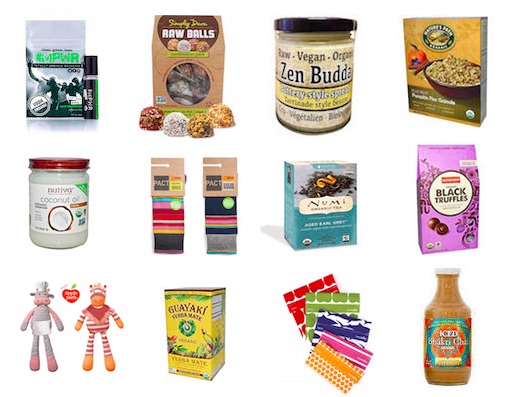
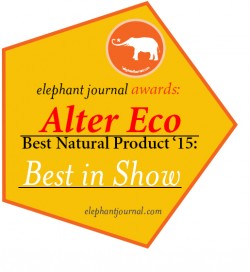
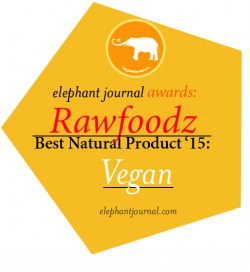
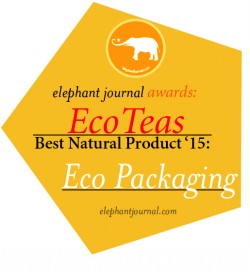
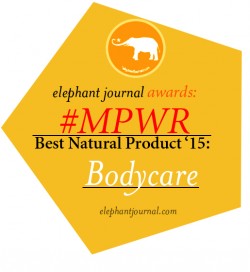
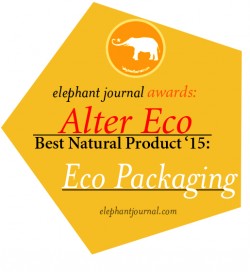

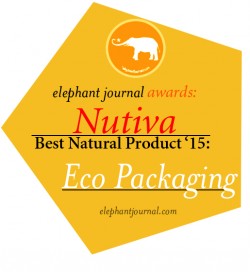
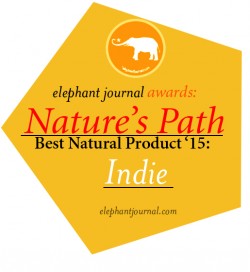
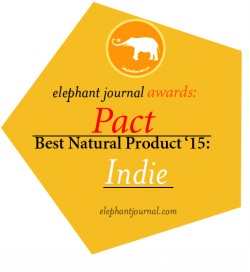
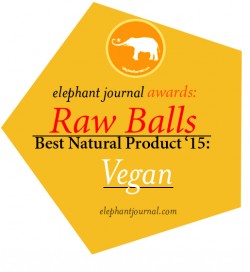
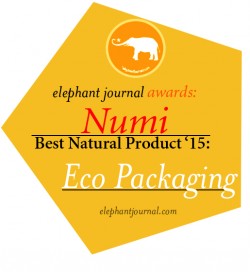


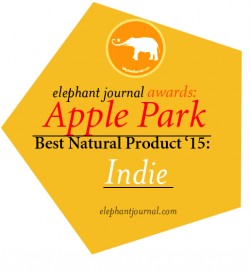
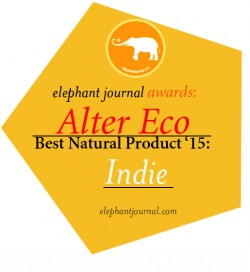





Read 0 comments and reply